语法练习课-----现在完成时态
图片预览

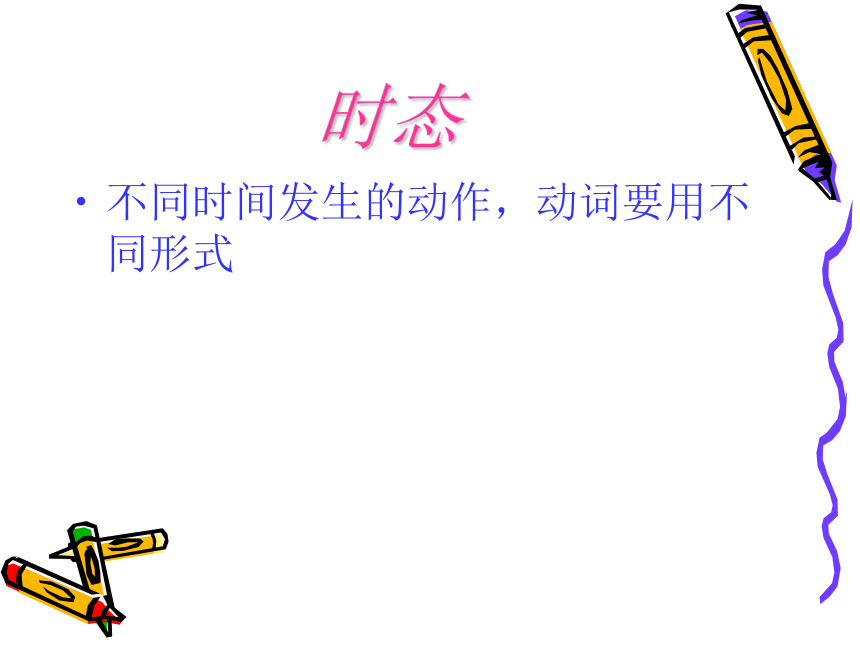
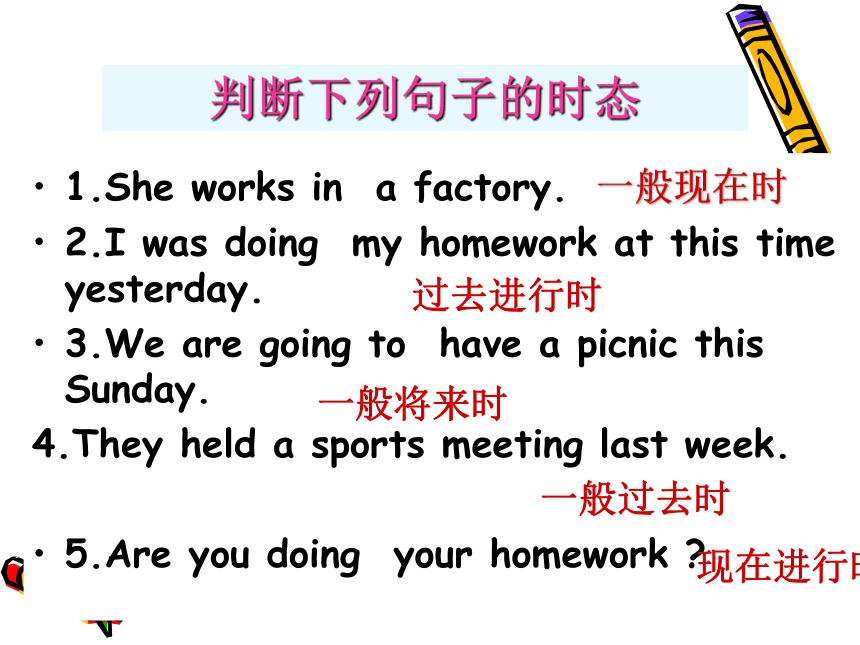
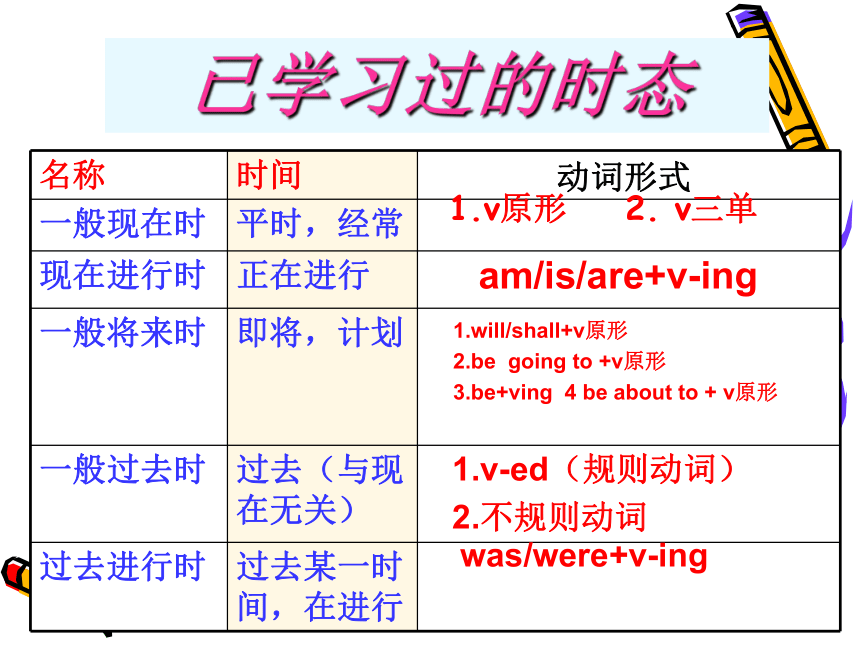
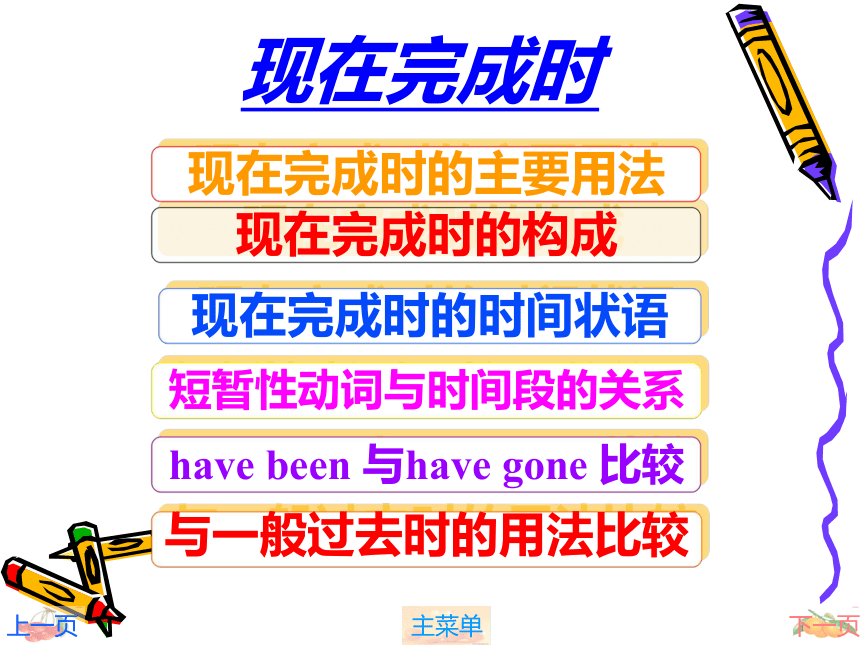

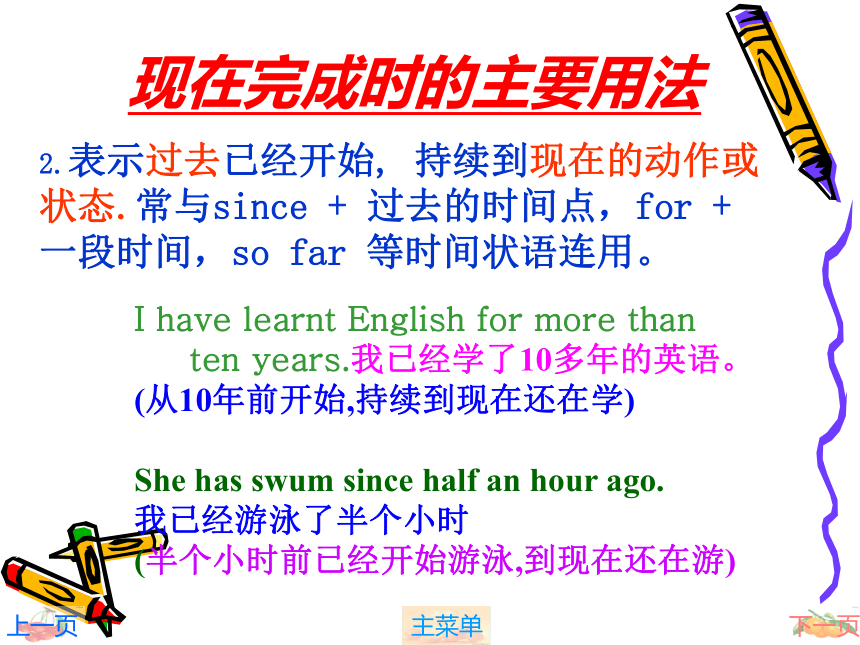
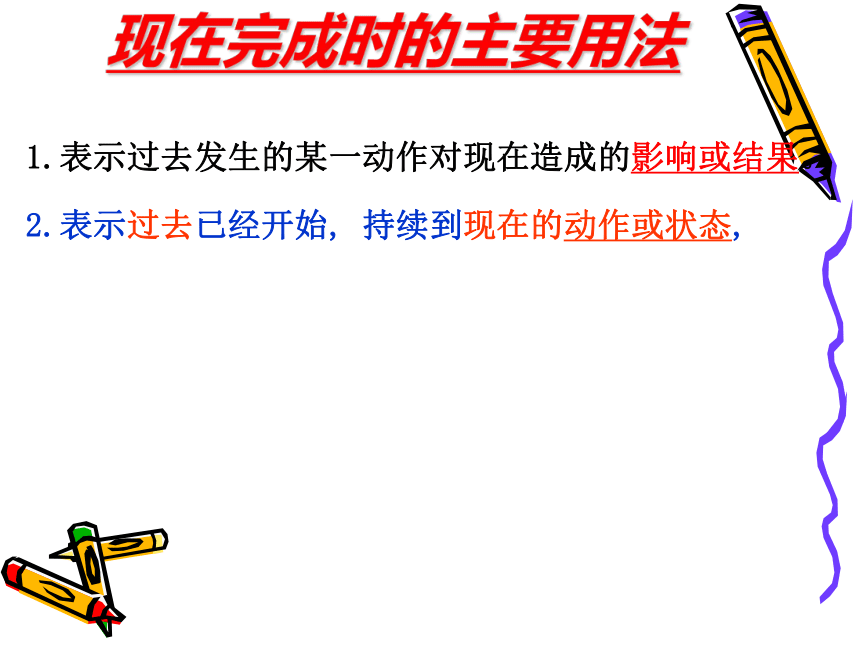
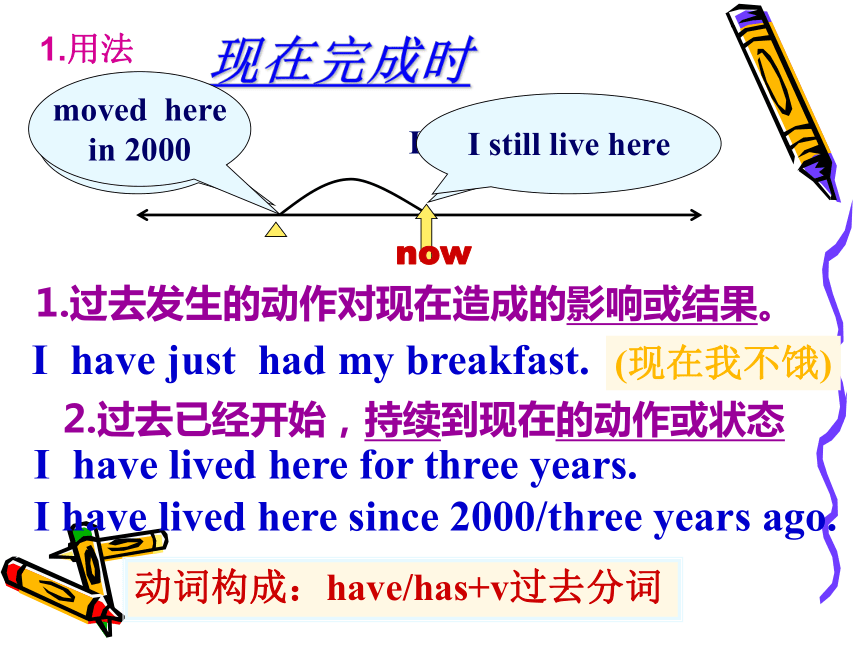
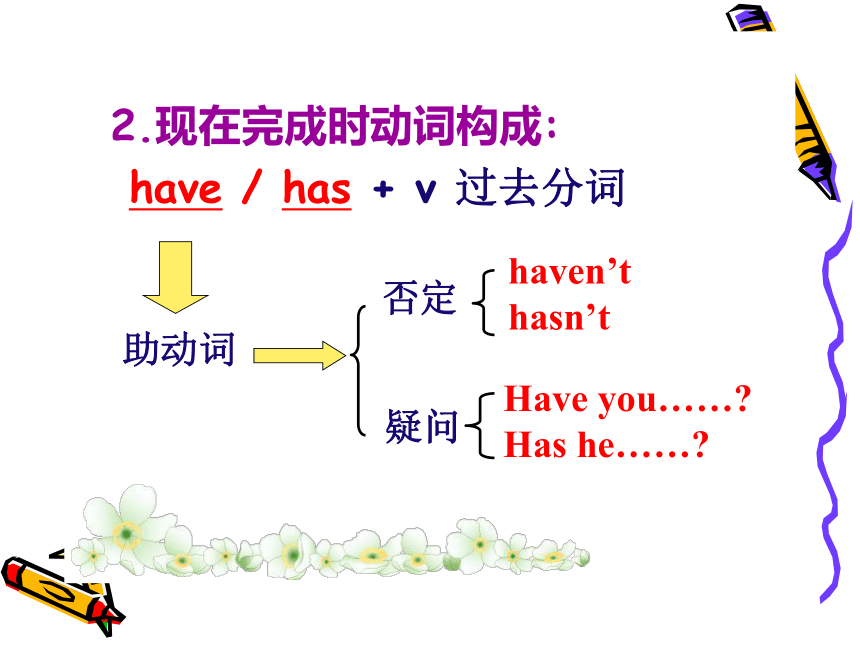
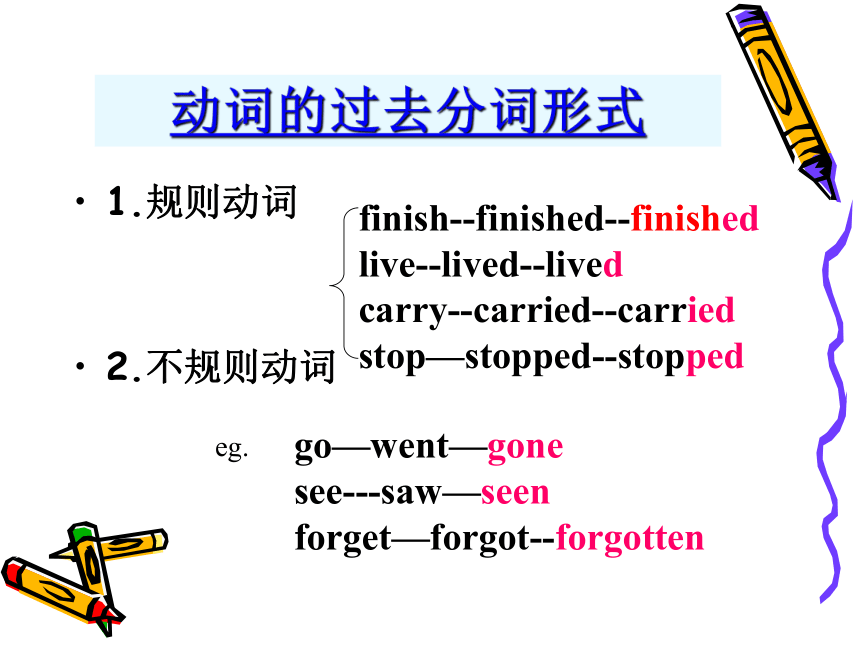
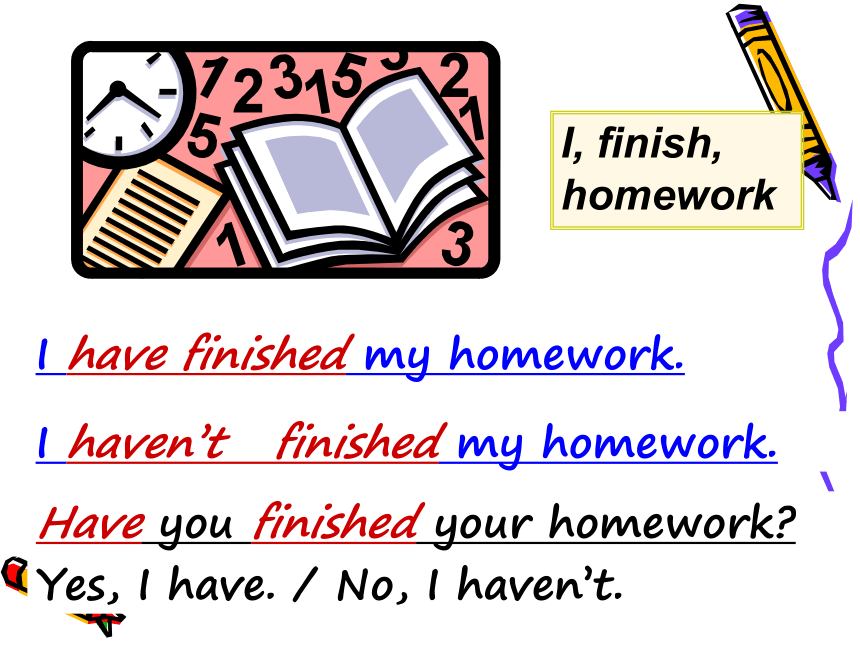
文档简介
课件31张PPT。-----现在完成时态语法练习课时态不同时间发生的动作,动词要用不同形式
判断下列句子的时态1.She works in a factory.
2.I was doing my homework at this time yesterday.
3.We are going to have a picnic this Sunday.
4.They held a sports meeting last week.
5.Are you doing your homework ?一般现在时过去进行时一般将来时一般过去时现在进行时已学习过的时态1.v原形 2. v三单am/is/are+v-ing1.will/shall+v原形
2.be going to +v原形
3.be+ving 4 be about to + v原形
1.v-ed(规则动词)
2.不规则动词was/were+v-ing现在完成时
主菜单上一页下一页现在完成时的构成现在完成时的主要用法现在完成时的时间状语短暂性动词与时间段的关系have been 与have gone 比较与一般过去时的用法比较现在完成时的主要用法上一页下一页-- It’s so dark.
--Someone has turned off the light.
(有人刚把灯关了,对现在造成的结果是:现在很黑)-- Are you free?
--I have finished my homework. I am free
(我已经完成了家庭作业,对现在造成的结果是很有空)主菜单1.表示过去发生的某一动作对现在造成的影响或结果。 上一页下一页I have learnt English for more than
ten years.我已经学了10多年的英语。
(从10年前开始,持续到现在还在学)
She has swum since half an hour ago.
我已经游泳了半个小时
(半个小时前已经开始游泳,到现在还在游)
现在完成时的主要用法主菜单2.表示过去已经开始, 持续到现在的动作或状态.常与since + 过去的时间点,for + 一段时间,so far 等时间状语连用。现在完成时的主要用法1.表示过去发生的某一动作对现在造成的影响或结果。 2.表示过去已经开始, 持续到现在的动作或状态,现在完成时1.过去发生的动作对现在造成的影响或结果。2.过去已经开始,持续到现在的动作或状态动词构成:have/has+v过去分词had breakfastI have just had my breakfast.(现在我不饿)I’m not hungry nowmoved here
in 2000I still live hereI have lived here for three years.I have lived here since 2000/three years ago. now1.用法
2.现在完成时动词构成:
have / has + v 过去分词
助动词否定haven’t
hasn’t疑问Have you……?
Has he……?动词的过去分词形式1.规则动词
2.不规则动词finish--finished--finished
live--lived--lived
carry--carried--carried
stop—stopped--stopped
eg.go—went—gone
see---saw—seen
forget—forgot--forgottenI, finish,
homeworkI haven’t finished my homework.Have you finished your homework?
Yes, I have. / No, I haven’t.I have finished my homework.1. 她成为一名护士已经三年了。
2. 我五年前就认识李雷了。
3. 那些相片我已经寄给他了。(post)
4. 我来到这个学校后,他就一直教我。
5. 我刚丢了我的历史书。She has been a nurse for three years.I have known Lilei since five years ago. I have already posted the photos to him.He has taught me since I came to the school.I have just lost my history book. ( 1).for+表示一段时间的短语
( 2).since+表示过去时间点的词语
( 3).since+表示过去时间的时间状语从句eg.I have been a teacher ______ a year.
He has been at this school _______ 1992.
We have learned 1,000 English words _______ we came to this school.forsincesince B. 常与 just, already, yet, ever, never,so far 连用,
强调动作完成,不强调动作的持续. eg.Have you _____been to Japan?
I have _____ finished my homework.
I have finished my homework ______.
I haven’t finished my homework ____.everjustalreadyyet
A.for+时间段/ since +时间点3. 现在完成时的时间状语短暂性动词与时间段的关系 ●短暂性动词在肯定句、疑问句中不能与时间段连用,这些动词是:①become,
②begin, ③buy, ④borrow,
⑤come (go, arrive), ⑥die,
⑦finish, ⑧join, ⑨ leave, 等。
上一页下一页●在完成式中表述这种意思,我们常用相应的延续性动词 来代替短暂性动词。主菜单四. become →be, begin→ have ,
borrow → keep, buy → have,
come (go, arrive, get) →be here/there/in…,
die→ be dead, finish→ be over,
join→ be in …(be a member of … )
leave→ be away ( from…),
下一页上一页主菜单 ●但在否定句中,短暂性动词可以与时间段连用。
如:I haven’t bought the bike for a year.
我买这辆自行车还不到一年。
She hasn’t come here for an hour.
她来这儿还没有一个小时。上一页下一页主菜单 ? 翻 译 练 习:
1.我买了这块手表五年了。
2.这位老人已经死了十年了。 I have bought this watch for five years.
I have had this watch for five years/since 5 years ago. The old man has died for ten years.
The old man has been dead for ten
years/since 10 years ago.WW下一页上一页主菜单 3.他已经回来三天了。
4.自从六点钟他就来这儿了。
5.我离开家乡已十年了。 He has come back for 3 days.
He has been back for 3 days/since 3
days ago. He has come here since 6 o’clock.
He has been here since 6 o’clock. I have left hometown for 10 years.
I have been away from hometown for 10
years.
WWW下一页上一页主菜单五.have been 与have gone 的用法比较 have been to 意思是“到过,去过”,表示曾经到过某处,但现在人不在那儿。
have gone to 意思是“去了”,表示已经去了某地,现在人可能在去的途中或已在那儿了。
have been in 意思是“呆在某处一段时间了”上一页下一页主菜单1. Has she ever been to Nanjing?
她曾去过南京吗?
2.You have never been there, have you?
你以前从未去过那儿,是吗?
3.I have been to Guiling ,I went there
last year.
我去过桂林,我去年去的。
4.She has gone to Nanjing.
她已经去南京了。上一页下一页主菜单?六.与一般过去时的用法比较一.现在完成时和一般过去时都是说过去的事情,但现在完成时注意的不是事情本身,而是强调事情与现在保持的某种密切联系(如现在的结果,影响,一直延续到现在等);而一般过去时,则只讲述发生在过去的动作和事情与现在没有关系。
上一页下一页主菜单eg:He has bought an English-Chinese
dictionary. 他已经买了一本英汉字典。
He bought an English-Chinese
dictionary. 他曾买过一本英汉字典。上一页下一页? 第一句用现在完成时时态,想表达意为:“He bought an English-Chinese dictionary. And he still has it” “过去他买了一本英汉字典,现在他还有这本字典” 。?第二句用过去时只叙述过去他买过一本英汉字典这一事实,至于现在他是否有这本字典并未强
调说明。主菜单二.时间状语的区别:
当有一个表示过去某一特定时间的状语时,不用现在完成时,而用一般过去时: 上一页下一页eg: I saw the film on television yesterday . 现在完成时现在完成时总是与since+时间点,for +时间段连用。eg: They have known each other since 1950 . Since he was a child ,he has lived in England.主菜单选用 for和 since填空:
1.We haven’t seen each other ______ a long time.
2.His father has been in the Party ______ 10 years ago.
3.The film has been on ______ 20 minutes.
4.Mr Green has worked here ______ he came to China.
5.His grandparents have been dead ______ several years.
6. It’s five years _______ we met last time.forsinceforsinceforsince下一页上一页主菜单用Have been to, have gone to, have been in 填空Mike and his parents __________ the north for half a year.
Mum is not at home now. she _________ the shop.
______ you ever _____ to kunming ? Never.
Where _____ you ______ these days?
Has Jim arrived yet?
Yes, he _______ here for several days.
Where is Peter? I don’t know where he ________.
Hi Jim! Where _____ you _____ ? Li Lei is looking for you.have been inhas gone tohave beenHave beenhas been has gonehave been下一页上一页主菜单The house is dirty. We _______it for weeks.?
A didn’t clean B hadn’t cleaned C don’t clean D haven’t cleaned
2. ---____the sports meeting might be put off.? ---Yes, it all depends on the weather.? A I’ve been told B I’ve told C I’m told D I told
3. ---- I’m sorry to keep you waiting.? ----Oh, not at all. I _____here only a few minutes.? A have been B had been C was D will be
?4. You don’t need to describe her. I _______ her several times.? A. had met B have met C met D meet
5. -----Will you go to Beijing for vacation ? -----I _______ to go , but I don’t know if I can go . A was planning B have planned
C had been planning D have been planning? 6. --When will they leave ? ---They ______very soon . A do leave B are leaving C have left D leave?
7 --Was he studying for an exam ? --Yes , he's ____ it last week. A doing B to take C making D to give 8.The teacher told the pupils that the earth ____ round.
A is B would C was D were
9. She _______ such an interesting book before. A was never reading B will never read
C had never read D has never read 10.How long do you think the meeting ______ A is lasting B is lasted C will last D lasts 改 错
1. How long have you begun to study English?
2. I have borrowed this book for two weeks.
3. The river has become very dirty since last August.
4. Our manager is away today. He has been to Guangzhou on business.
5. He has gone out for two years.studiedkeptbeengonebeen下一页上一页主菜单、翻译下列句子: 1. 你曾经吃过鱼和薯条吗? 2. 我刚刚丢了我的语文书。 3. 我以前从来没去过那个公园。 4. 他已经吃过午饭了。 5. 你已经看过这部电影了吗? 6. 我哥哥还没回来。 7. 我自从上星期看过这部电影。 8. 自从1992年他住在这里。 9.这本字典我已买了三年了。 10.他离开中国三年了 1.Have you eaten fish and french frise?
2.I have lost my Chinese book.
3 I have never been to that park. 4.He has already had lunch. 5 Have you seen this movie yet?
6 My brother has not returned. 7 I have seen this movie since last week.
8 He has lived here since 1992.
9 I have had this dictionary for three years.
10 He has been away China for three years. Thank you
Bye-bye!
判断下列句子的时态1.She works in a factory.
2.I was doing my homework at this time yesterday.
3.We are going to have a picnic this Sunday.
4.They held a sports meeting last week.
5.Are you doing your homework ?一般现在时过去进行时一般将来时一般过去时现在进行时已学习过的时态1.v原形 2. v三单am/is/are+v-ing1.will/shall+v原形
2.be going to +v原形
3.be+ving 4 be about to + v原形
1.v-ed(规则动词)
2.不规则动词was/were+v-ing现在完成时
主菜单上一页下一页现在完成时的构成现在完成时的主要用法现在完成时的时间状语短暂性动词与时间段的关系have been 与have gone 比较与一般过去时的用法比较现在完成时的主要用法上一页下一页-- It’s so dark.
--Someone has turned off the light.
(有人刚把灯关了,对现在造成的结果是:现在很黑)-- Are you free?
--I have finished my homework. I am free
(我已经完成了家庭作业,对现在造成的结果是很有空)主菜单1.表示过去发生的某一动作对现在造成的影响或结果。 上一页下一页I have learnt English for more than
ten years.我已经学了10多年的英语。
(从10年前开始,持续到现在还在学)
She has swum since half an hour ago.
我已经游泳了半个小时
(半个小时前已经开始游泳,到现在还在游)
现在完成时的主要用法主菜单2.表示过去已经开始, 持续到现在的动作或状态.常与since + 过去的时间点,for + 一段时间,so far 等时间状语连用。现在完成时的主要用法1.表示过去发生的某一动作对现在造成的影响或结果。 2.表示过去已经开始, 持续到现在的动作或状态,现在完成时1.过去发生的动作对现在造成的影响或结果。2.过去已经开始,持续到现在的动作或状态动词构成:have/has+v过去分词had breakfastI have just had my breakfast.(现在我不饿)I’m not hungry nowmoved here
in 2000I still live hereI have lived here for three years.I have lived here since 2000/three years ago. now1.用法
2.现在完成时动词构成:
have / has + v 过去分词
助动词否定haven’t
hasn’t疑问Have you……?
Has he……?动词的过去分词形式1.规则动词
2.不规则动词finish--finished--finished
live--lived--lived
carry--carried--carried
stop—stopped--stopped
eg.go—went—gone
see---saw—seen
forget—forgot--forgottenI, finish,
homeworkI haven’t finished my homework.Have you finished your homework?
Yes, I have. / No, I haven’t.I have finished my homework.1. 她成为一名护士已经三年了。
2. 我五年前就认识李雷了。
3. 那些相片我已经寄给他了。(post)
4. 我来到这个学校后,他就一直教我。
5. 我刚丢了我的历史书。She has been a nurse for three years.I have known Lilei since five years ago. I have already posted the photos to him.He has taught me since I came to the school.I have just lost my history book. ( 1).for+表示一段时间的短语
( 2).since+表示过去时间点的词语
( 3).since+表示过去时间的时间状语从句eg.I have been a teacher ______ a year.
He has been at this school _______ 1992.
We have learned 1,000 English words _______ we came to this school.forsincesince B. 常与 just, already, yet, ever, never,so far 连用,
强调动作完成,不强调动作的持续. eg.Have you _____been to Japan?
I have _____ finished my homework.
I have finished my homework ______.
I haven’t finished my homework ____.everjustalreadyyet
A.for+时间段/ since +时间点3. 现在完成时的时间状语短暂性动词与时间段的关系 ●短暂性动词在肯定句、疑问句中不能与时间段连用,这些动词是:①become,
②begin, ③buy, ④borrow,
⑤come (go, arrive), ⑥die,
⑦finish, ⑧join, ⑨ leave, 等。
上一页下一页●在完成式中表述这种意思,我们常用相应的延续性动词 来代替短暂性动词。主菜单四. become →be, begin→ have ,
borrow → keep, buy → have,
come (go, arrive, get) →be here/there/in…,
die→ be dead, finish→ be over,
join→ be in …(be a member of … )
leave→ be away ( from…),
下一页上一页主菜单 ●但在否定句中,短暂性动词可以与时间段连用。
如:I haven’t bought the bike for a year.
我买这辆自行车还不到一年。
She hasn’t come here for an hour.
她来这儿还没有一个小时。上一页下一页主菜单 ? 翻 译 练 习:
1.我买了这块手表五年了。
2.这位老人已经死了十年了。 I have bought this watch for five years.
I have had this watch for five years/since 5 years ago. The old man has died for ten years.
The old man has been dead for ten
years/since 10 years ago.WW下一页上一页主菜单 3.他已经回来三天了。
4.自从六点钟他就来这儿了。
5.我离开家乡已十年了。 He has come back for 3 days.
He has been back for 3 days/since 3
days ago. He has come here since 6 o’clock.
He has been here since 6 o’clock. I have left hometown for 10 years.
I have been away from hometown for 10
years.
WWW下一页上一页主菜单五.have been 与have gone 的用法比较 have been to 意思是“到过,去过”,表示曾经到过某处,但现在人不在那儿。
have gone to 意思是“去了”,表示已经去了某地,现在人可能在去的途中或已在那儿了。
have been in 意思是“呆在某处一段时间了”上一页下一页主菜单1. Has she ever been to Nanjing?
她曾去过南京吗?
2.You have never been there, have you?
你以前从未去过那儿,是吗?
3.I have been to Guiling ,I went there
last year.
我去过桂林,我去年去的。
4.She has gone to Nanjing.
她已经去南京了。上一页下一页主菜单?六.与一般过去时的用法比较一.现在完成时和一般过去时都是说过去的事情,但现在完成时注意的不是事情本身,而是强调事情与现在保持的某种密切联系(如现在的结果,影响,一直延续到现在等);而一般过去时,则只讲述发生在过去的动作和事情与现在没有关系。
上一页下一页主菜单eg:He has bought an English-Chinese
dictionary. 他已经买了一本英汉字典。
He bought an English-Chinese
dictionary. 他曾买过一本英汉字典。上一页下一页? 第一句用现在完成时时态,想表达意为:“He bought an English-Chinese dictionary. And he still has it” “过去他买了一本英汉字典,现在他还有这本字典” 。?第二句用过去时只叙述过去他买过一本英汉字典这一事实,至于现在他是否有这本字典并未强
调说明。主菜单二.时间状语的区别:
当有一个表示过去某一特定时间的状语时,不用现在完成时,而用一般过去时: 上一页下一页eg: I saw the film on television yesterday . 现在完成时现在完成时总是与since+时间点,for +时间段连用。eg: They have known each other since 1950 . Since he was a child ,he has lived in England.主菜单选用 for和 since填空:
1.We haven’t seen each other ______ a long time.
2.His father has been in the Party ______ 10 years ago.
3.The film has been on ______ 20 minutes.
4.Mr Green has worked here ______ he came to China.
5.His grandparents have been dead ______ several years.
6. It’s five years _______ we met last time.forsinceforsinceforsince下一页上一页主菜单用Have been to, have gone to, have been in 填空Mike and his parents __________ the north for half a year.
Mum is not at home now. she _________ the shop.
______ you ever _____ to kunming ? Never.
Where _____ you ______ these days?
Has Jim arrived yet?
Yes, he _______ here for several days.
Where is Peter? I don’t know where he ________.
Hi Jim! Where _____ you _____ ? Li Lei is looking for you.have been inhas gone tohave beenHave beenhas been has gonehave been下一页上一页主菜单The house is dirty. We _______it for weeks.?
A didn’t clean B hadn’t cleaned C don’t clean D haven’t cleaned
2. ---____the sports meeting might be put off.? ---Yes, it all depends on the weather.? A I’ve been told B I’ve told C I’m told D I told
3. ---- I’m sorry to keep you waiting.? ----Oh, not at all. I _____here only a few minutes.? A have been B had been C was D will be
?4. You don’t need to describe her. I _______ her several times.? A. had met B have met C met D meet
5. -----Will you go to Beijing for vacation ? -----I _______ to go , but I don’t know if I can go . A was planning B have planned
C had been planning D have been planning? 6. --When will they leave ? ---They ______very soon . A do leave B are leaving C have left D leave?
7 --Was he studying for an exam ? --Yes , he's ____ it last week. A doing B to take C making D to give 8.The teacher told the pupils that the earth ____ round.
A is B would C was D were
9. She _______ such an interesting book before. A was never reading B will never read
C had never read D has never read 10.How long do you think the meeting ______ A is lasting B is lasted C will last D lasts 改 错
1. How long have you begun to study English?
2. I have borrowed this book for two weeks.
3. The river has become very dirty since last August.
4. Our manager is away today. He has been to Guangzhou on business.
5. He has gone out for two years.studiedkeptbeengonebeen下一页上一页主菜单、翻译下列句子: 1. 你曾经吃过鱼和薯条吗? 2. 我刚刚丢了我的语文书。 3. 我以前从来没去过那个公园。 4. 他已经吃过午饭了。 5. 你已经看过这部电影了吗? 6. 我哥哥还没回来。 7. 我自从上星期看过这部电影。 8. 自从1992年他住在这里。 9.这本字典我已买了三年了。 10.他离开中国三年了 1.Have you eaten fish and french frise?
2.I have lost my Chinese book.
3 I have never been to that park. 4.He has already had lunch. 5 Have you seen this movie yet?
6 My brother has not returned. 7 I have seen this movie since last week.
8 He has lived here since 1992.
9 I have had this dictionary for three years.
10 He has been away China for three years. Thank you
Bye-bye!
同课章节目录
- 词法
- 名词
- 动词和动词短语
- 动词语态
- 动词时态
- 助动词和情态动词
- 非谓语动词
- 冠词
- 代词
- 数词和量词
- 形容词副词及其比较等级
- 介词和介词短语
- 连词和感叹词
- 构词法
- 相似、相近词比较
- 句法
- 陈述句
- 一般疑问句和否定疑问句
- 特殊疑问句及选择疑问句
- 反意疑问句
- 存在句(There be句型)
- 宾语从句
- 定语从句
- 状语从句
- 主谓一致问题
- 简单句
- 并列句
- 复合句
- 主谓一致
- 主、表语从句
- 名词性从句
- 直接引语和间接引语
- 虚拟语气
- 感叹句
- 强调句
- 倒装句
- 祈使句
- 句子的成分
- 句子的分类
- 题型专区
- 单项选择部分
- 易错题
- 完形填空
- 阅读理解
- 词汇练习
- 听说训练
- 句型转换
- 补全对话
- 短文改错
- 翻译
- 书面表达
- 任务型阅读
- 语法填空
- 其他资料
